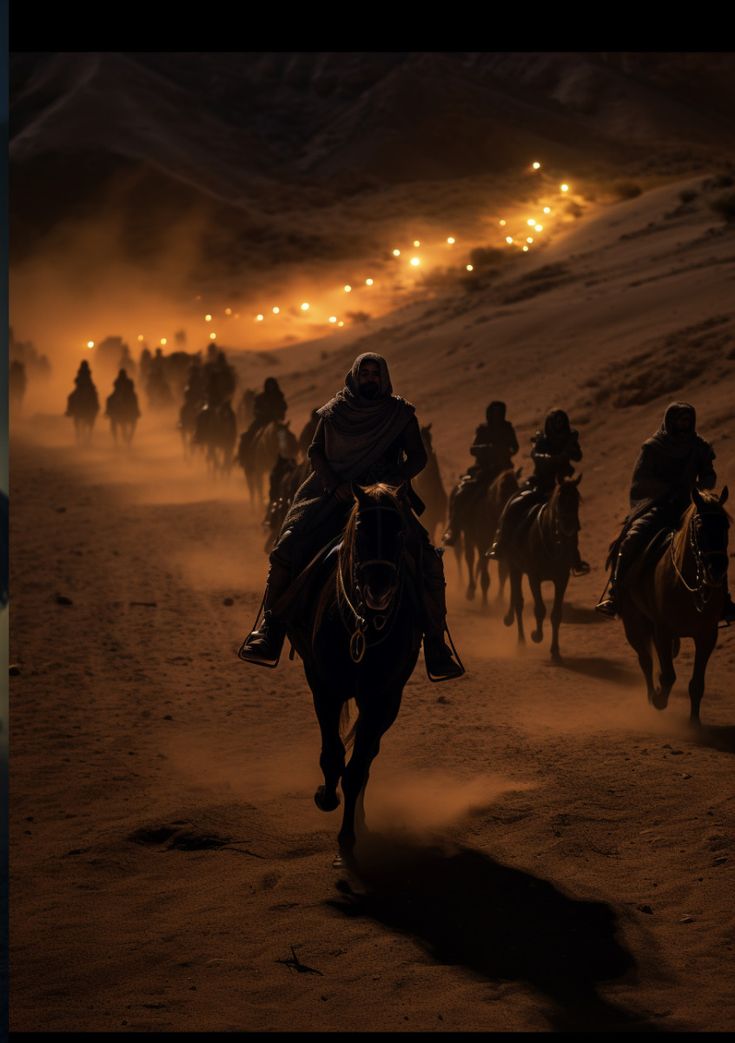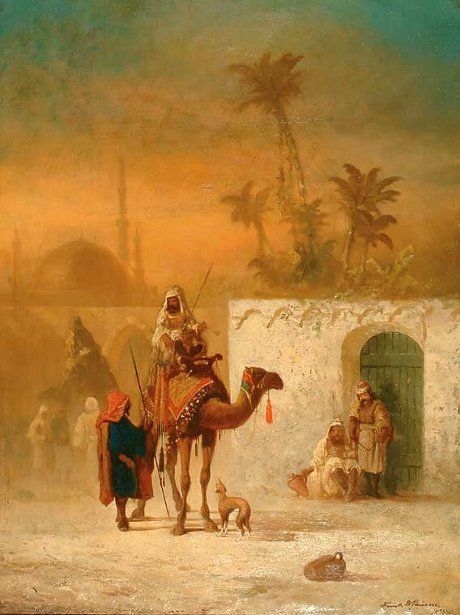.jpg)
ESPIONAGE IN ISLAMIC HISTORY
The Prophet Muhammad (peace be upon him) would send spies during both war and peace to gather intelligence about the enemy. To ensure security on the opposing side, he would even allow them to speak against him when necessary. He had spies in Mecca. Merchants who were displeased with the attitude of the Meccan polytheists would provide intelligence to the Muslims.
Uthman ibn Affan, one of the Prophet’s friends, when he was sent to Mecca as an envoy, stayed there for intelligence purposes and regularly sent information back to Medina. In fact, during the pledge of allegiance at Hudaybiyyah in the 6th year of Hijrah, when the believers swore loyalty to him, the Prophet Muhammad said regarding one of his own hands, “This is also Uthman’s hand; I pledge allegiance on his behalf."
The Prophet Musa (Moses, peace be upon him) appointed twelve naqibs to understand the enemy’s situation (Al-Ma'idah: 12). Naqib means representative and inspector. Al-Qurtubi states, "This verse is evidence for the use of spies.”
How Many Camels Per Day?
Before the Battle of Badr, the Prophet Muhammad asked two captives how many camels the enemy slaughtered per day. When they answered, “One day ten, the next day nine” he estimated—based on how many people a single camel could feed—that their numbers were around 950–1000, and his estimation turned out to be accurate.
In 624, Basbas ibn Amr and Adiy ibn Abi al-Za’ba were sent as spies to gather information on a caravan traveling from Damascus to Mecca. They went all the way to the coast and eavesdropped on two girls conversing near a water well. One girl told the other, "Tomorrow or the day after, the caravan will arrive. When it does, I will pay your debt." From this, they understood that the caravan had not yet reached Badr and relayed this information to the Prophet.
The scouts captured a slave from the caravan and began beating him to extract information. The Prophet Muhammad prevented this, making it the first recorded instance in history of ensuring that intelligence-gathering was conducted within ethical boundaries. Furthermore, torture and mistreatment during interrogation lead to false information.

Conceal Your Purpose!
The Prophet’s uncle Abbas became Muslim before the conquest of Khaybar but kept his faith hidden. The Prophet advised his uncle, “It is better for you to remain in Mecca.” Abbas would write letters to the Prophet about the polytheists’ plans.
While traveling to Mecca, the Prophet received intelligence from a Khuza’ah spy, which serves as evidence for the permissibility of employing non-Muslims in espionage. Before the battles of Banu Mustaliq and Hunayn, two enemy spies were captured and executed.
Except for the Battle of Tabuk, the Prophet never disclosed his true military objectives. He diverted attention elsewhere. When sending Abdullah ibn Jahsh on an expedition, he gave him a sealed letter and instructed him to open it only after setting out.
Intelligence and Backbiting
The Prophet Muhammad not only gathered intelligence but also organized necessary operations. He assigned Abdullah ibn Unais to assassinate Khaled bin Sufyan al-Hathali, who was preparing an attack on Medina. During this mission, he instructed him to perform prayers using only gestures (bi’l-ima’).
Caliph Abu Bakr sent spies everywhere. During the Battle of Ajnadayn, Amr ibn al-As infiltrated the enemy headquarters, disguising his identity to gather intelligence. He also turned enemy spies into double agents working for him. Khalid ibn al-Walid made agreements with the Hira people and used them as spies against the Persians.
The Prophet would inquire about what was happening among the people. Ibn Hajar, in Fath al-Bari, states, “Reporting to rulers and virtuous individuals what is said about them is permissible and does not constitute backbiting (ghibah).”
Caliph Umar had informants among the people. Caliph Uthman would walk among the people on Fridays, asking about prices, the state of officials, and the condition of the sick.

Let Them Remain Unaware!
In the 8th year of Hijrah, the Prophet prepared to conquer Mecca and prayed, “O Allah! Keep the Quraysh unaware until we reach Mecca.” Hatib ibn Abi Balta'ah, one of the senior emigrants and a veteran of Badr, had his family in Mecca and feared for their safety.
Because of this, he secretly wrote a letter to the Quraysh informing them of the Prophet’s planned movement. He sent the letter through Sariyah, a freed slave of Abu Lahab.
The archangel Jibril (Gabriel) informed the Prophet of the situation. He then sent Ali, Zubayr, Talha, Miqdad, Ammar, and Abu Mirsad, instructing them, “Go as far as Hah Garden. There is a weak woman there. She has a letter. Take the letter from her and let her go. If she resists and refuses to give it, behead her.”
They caught up with the woman. When Ali drew his sword, she took the letter out from her hair and handed it over. They brought it to the Prophet.
The Prophet summoned Hatib ibn Abi Balta’ah and asked, “Why did you do this?” He replied, “O Messenger of Allah! Since the day I believed in you, I have never turned to disbelief. However, my family is among the Quraysh. I wanted to ensure that they would not harm my family. Otherwise, I know my letter would not benefit them.”
The Prophet accepted his explanation. At that moment, the verse “O you who believe! Do not take My enemies and your enemies as allies” (Al-Mumtahina: 1) was revealed. A hadith confirms that the people of Badr are guaranteed paradise.

Who Broke the Code?
Although the Umayyads established a magnificent state organization, in their later years, they lost power due to arrogance-induced intelligence failures. Because of this, the Abbasids placed great importance on intelligence.
The Abbasid Caliph al-Nasir li-Din Allah (1158–1225) had spies in every city and village. In Baghdad, each neighborhood’s night watchmen would write down reports of the good or bad happenings they observed during their patrols and secretly deliver them to the caliph in the morning.
Because of this, everyone feared him both inside and outside the empire. Since he was aware of everything, people believed that jinn were informing him.
The world’s first cryptanalysis (code-breaking) method was developed during the Abbasid era by the mathematician al-Kindi. He discovered that in every alphabet, certain letters are used more frequently than others. Using this mathematical insight, he was able to decipher coded messages and determine their original content.
The Mamluk sultans employed muhbirs (informants) who roamed the city, its markets, mosques, squares, and streets, reporting everything they saw and heard in the evening. Historian Al-Kattani states, “If newspapers had existed at that time, sultans would have subscribed to all of them.”
Önceki Yazılar
-
THE WATER OF IMMORTALITY IN THE “LAND OF DARKNESS”28.01.2026
-
THE WORLD LEARNED WHAT FORBEARANCE IS FROM SULTAN MEHMED II21.01.2026
-
THE RUSH FOR GOLD14.01.2026
-
TRACES OF ISLAM IN CONSTANTINOPOLIS7.01.2026
-
WHO CAN FORGIVE THE KILLER?31.12.2025
-
WHEN WAS PROPHET ISA (JESUS) BORN?24.12.2025
-
IF SULTAN MEHMED II HE HAD CONQUERED ROME…17.12.2025
-
VIENNA NEVER FORGOT THE TURKS10.12.2025
-
THE FIRST UNIVERSITY IN THE WORLD WAS FOUNDED BY MUSLIMS3.12.2025
-
WHO BETRAYED PROPHET ISA (JESUS)?26.11.2025